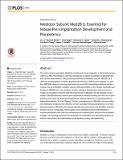| dc.contributor.author | Li, Lin | en_US |
| dc.contributor.author | Walsh, Ryan M. | en_US |
| dc.contributor.author | Wagh, Vilas | en_US |
| dc.contributor.author | James, Marianne F. | en_US |
| dc.contributor.author | Beauchamp, Roberta L. | en_US |
| dc.contributor.author | Chang, Yuh-Shin | en_US |
| dc.contributor.author | Gusella, James F. | en_US |
| dc.contributor.author | Hochedlinger, Konrad | en_US |
| dc.contributor.author | Ramesh, Vijaya | en_US |
| dc.date.accessioned | 2015-11-03T15:58:51Z | |
| dc.date.issued | 2015 | en_US |
| dc.identifier.citation | Li, Lin, Ryan M. Walsh, Vilas Wagh, Marianne F. James, Roberta L. Beauchamp, Yuh-Shin Chang, James F. Gusella, Konrad Hochedlinger, and Vijaya Ramesh. 2015. “Mediator Subunit Med28 Is Essential for Mouse Peri-Implantation Development and Pluripotency.” PLoS ONE 10 (10): e0140192. doi:10.1371/journal.pone.0140192. http://dx.doi.org/10.1371/journal.pone.0140192. | en |
| dc.identifier.issn | 1932-6203 | en |
| dc.identifier.uri | http://nrs.harvard.edu/urn-3:HUL.InstRepos:23474075 | |
| dc.description.abstract | The multi-subunit mammalian Mediator complex acts as an integrator of transcriptional regulation by RNA Polymerase II, and has emerged as a master coordinator of development and cell fate determination. We previously identified the Mediator subunit, MED28, as a cytosolic binding partner of merlin, the Neurofibromatosis 2 (NF2) tumor suppressor, and thus MED28 is distinct in having a cytosolic role as an NF2 interacting protein as well as a nuclear role as a Mediator complex subunit. Although limited in vitro studies have been performed on MED28, its in vivo function remains unknown. Employing a knockout mouse model, we describe for the first time the requirement for Med28 in the developing mouse embryo. Med28-deficiency causes peri-implantation lethality resulting from the loss of pluripotency of the inner cell mass accompanied by reduced expression of key pluripotency transcription factors Oct4 and Nanog. Further, overexpression of Med28 in mouse embryonic fibroblasts enhances the efficiency of their reprogramming to pluripotency. Cre-mediated inactivation of Med28 in induced pluripotent stem cells shows that Med28 is required for their survival. Intriguingly, heterozygous loss of Med28 results in differentiation of induced pluripotent stem cells into extraembryonic trophectoderm and primitive endoderm lineages. Our findings document the essential role of Med28 in the developing embryo as well as in acquisition and maintenance of pluripotency during reprogramming. | en |
| dc.language.iso | en_US | en |
| dc.publisher | Public Library of Science | en |
| dc.relation.isversionof | doi:10.1371/journal.pone.0140192 | en |
| dc.relation.hasversion | http://www.ncbi.nlm.nih.gov/pmc/articles/PMC4596692/pdf/ | en |
| dash.license | LAA | en_US |
| dc.title | Mediator Subunit Med28 Is Essential for Mouse Peri-Implantation Development and Pluripotency | en |
| dc.type | Journal Article | en_US |
| dc.description.version | Version of Record | en |
| dc.relation.journal | PLoS ONE | en |
| dash.depositing.author | Walsh, Ryan M. | en_US |
| dc.date.available | 2015-11-03T15:58:51Z | |
| dc.identifier.doi | 10.1371/journal.pone.0140192 | * |
| dash.contributor.affiliated | Ramesh, Vijaya | |
| dash.contributor.affiliated | Walsh, Ryan M. | |
| dash.contributor.affiliated | Gusella, James | |
| dash.contributor.affiliated | Hochedlinger, Konrad | |


